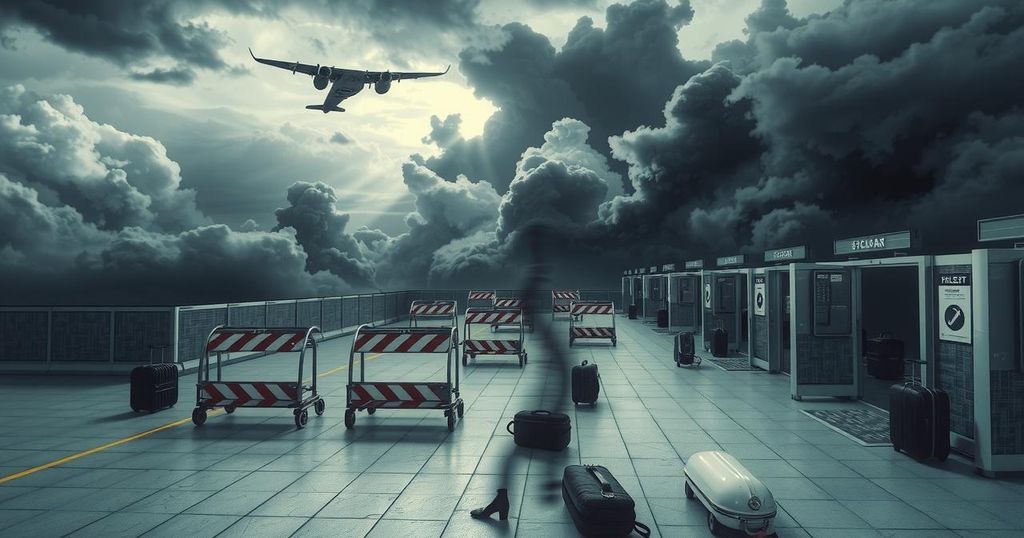President Trump Revives Travel Ban Impacting Multiple Countries, Creating International Chaos
President Trump has reinstated a comprehensive travel ban affecting multiple countries, causing widespread unprecedented disruptions across the travel industry. The ban, which includes complete restrictions for 13 nations and heightened scrutiny for others, threatens international relations and could lead to significant legal challenges. Airlines, universities, and travel agencies brace for impact as clients face abrupt cancellations and restricted mobility. The emotional toll on individuals and families is also considerable, marking a challenging time for global travel.
The landscape of American travel has dramatically shifted due to President Donald Trump’s reinstatement of a sweeping travel ban. This latest measure affects a wide range of countries—Cuba, Burma, Turkmenistan, Iran, and others—and it aims to expand upon previous restrictions. The renewed ban raises significant concerns regarding international mobility and its implications for families, students, and business travelers.
This move represents more than just a continuation of past policies; it is an expansive action with serious ramifications for the global travel industry. The new regulations, effective from early Monday, will result in a complete travel ban for citizens from 13 countries, adding stress to already strained immigration and travel systems. Critics are worried about the geopolitical and economic fallout stemming from this policy.
The banned countries include Afghanistan, Libya, Somalia, and Syria among others. Additional restrictions affect travelers from nations like Venezuela and Laos. The justification provided by the administration revolves around national security; however, the widening scope is causing immediate turmoil across sectors closely tied to international exchange and tourism. Airlines and schools are among those at risk of disruption.
Airports around the United States are bracing for chaos, recalling unsettling memories from the 2017 travel ban era. Airlines are currently inundated with last-minute rebooking requests as new protocols are being hastily communicated. Immigration officers are preparing for potential confusion as travelers are caught off-guard by the sudden changes to entry rules.
In light of the new restrictions, the U.S. tourism industry is projected to take a significant hit. Although individual countries like Iran and Libya may not contribute vast numbers of tourists, they play pivotal roles in specific travel niches. Agencies catering to diaspora communities and sectors such as religious tourism now find their business models under threat, with summer travel plans thrown into jeopardy.
On the international front, this travel ban risks damaging diplomatic relations. Affected countries may react by implementing their own restrictions on American travelers or releasing travel advisories. As the world watches, negotiations on security, trade, and humanitarian matters could be complicated further by the fallout from these measures.
Legal challenges are anticipated swiftly, echoing past experiences during Trump’s first term where earlier travel bans faced judicial scrutiny. Various organizations focused on civil rights are preparing to contest the new regulations, which could lead to a complex and contentious legal battle concerning the scope of executive power in immigration policies.
Meanwhile, travel booking services are feeling the strain. Companies must adapt to the rapidly changing landscape by informing clients of amended rules and altering bookings accordingly. Travel advisors find themselves pivoting from typical planning duties to crisis response and managing the emotional tensions of clients amidst the upheaval.
Crucially, this ban affects real lives. The emotional impact resonates deeply among students seeking education, families yearning to reunite, and business leaders losing opportunities. This situation underscores the human cost often hidden behind policies that regulate travel and mobility.
In closing, Trump’s renewed travel ban marks a pivotal moment for global travel, risking to dismantle years of progress toward inclusive and accessible transnational movement. The hospitality sector now faces the critical challenge of navigating this unexpected turn, reflecting a need for agile response strategies in an increasingly complicated travel environment. The summer of 2025 will not only be remembered for the destinations we could not visit but for the broader implications of the bans we now grapple with.
The reinstatement of the travel ban signifies a troubling return to restrictive immigration policies under President Trump. The ramifications are extensive—impacting tourism, international relations, and the lives of individuals caught in the crossfire. As industries scramble to navigate these new regulations and legal battles loom, the consequences could redefine the landscape of American travel for the foreseeable future. With mounting pressures on international relationships and the tourism sector, the upcoming months will undoubtedly reveal further challenges and far-reaching effects for travelers worldwide.
Original Source: www.travelandtourworld.com




Post Comment